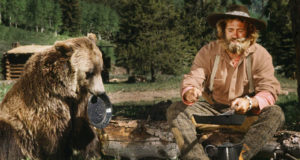“Sometimes you think you’re gettin’ food ‘cos there’s a coupla raisins in it, but it’s just a plate fulla horse apples.” Dewayne, or Dry Creek Wrangler School as he’s known to his 1.2 million YouTube subscribers, is dispensing life advice through his bushy grey beard. He’s wearing jeans and a Stetson, and in his left hand dangles a cigar. The advice in question: don’t confuse apples with manure. Trust your instincts, fellers, and don’t take no bull.
Dry Creek is one of many such content creators who — mainly in the manly haven of YouTube, shielded from TikTok’s distinct girliness — have become icons of Mountain Man straight-talkin’, tonics for city boys strung out by modern masculinity. His videos vary from day-to-day instructional content (“Three things I’ll never do to my horse again”) to the philosophical. In one, he discusses feminism. He regrets that modern women must “go out and lord it over men” with big-shot careers in order to be respected; he laments the way society “belittles” mothers, and how “men stopped being men and women stopped being women”. While a little dated, there is no straight-up toxicity in his philosophy: he’s a harmless old-timer, and his shtick is nostalgia, positing himself as a substitute gramps for deracinated young men.
But the longer one spends with the wild men of YouTube, the stranger and more extreme they become. Before long, you’ll happen upon Bjorn Andreas Bull-Hansen, a novelist and bushcrafter from Norway with nearly 700,000 subscribers. Similarly to Dry Creek, his format is based on vlogging time spent in the wilderness while offering philosophical titbits. But his titbits are made of much stronger stuff. Standing by a beautiful lake in the still-light middle of the night, Bull-Hansen tells us why so many men are single. Women are less attractive now because of “things such as obesity”; they have a “face covered in piercings, blue hair and a strong, independent woman attitude”. The incel alarm bells go off. “The high-value man will probably not be attracted by that.”
Bull-Hansen is dealing in a conceit which has been hugely successful in the manosphere in recent years: shoehorning redpill advice into content about rugged, natural masculinity. Of the marriage between the two, he says: “Nature is beautiful and brutal, but mostly beautiful. Everything here is as it should be, and as it has always been, and I like that.” In the mind of the anti-woke Mountain Man, the natural world is unapologetically aligned with the values of tribal patriarchy: it is a sphere where men can escape debilitating metrosexuality. Away from the deceptions of cities, this world is “real”. Standing pensively in the rain, Bull-Hansen denounces men “sitting looking at a screen, in a city apartment”. Being in the wilderness is a departure from Sodom, a return to the greatest and simplest conflicts not of man vs woman, but man vs nature, and sometimes man vs God.
It is not difficult to see how a casual viewer might become radicalised by such content. In one excruciating “comedy” video, he whittles a fake Covid passport out of wood. In another, he takes his son camping and rants about “disgusting” child custody arrangements controlled by vindictive mothers. He discusses how m-pox will provoke another worldwide lockdown, and has unsavoury takes on the UK riots. There are countless other creators doing similar things: one channel sees two men bro-ing out around a campfire, talking about “their masculine journey”; one gifts the other a knife and a waterproof Bible. Another channel urges men to “reject phone addiction and embrace nature” — but keep watching my videos, obviously — and to “train your body in the elements to mimic our ancestors”, with a clip of a hairy man screaming as he looks at the sky.
From where does this obsession with the wilderness, and the supposedly “sigma” philosophy of the Mountain Man, spring? The original Mountain Men were North American fur trappers — lone operatives or brigades venturing out west in the mid-1800s, setting up trading routes and dealing in lucrative beaver pelts to satisfy the desires of refined Europeans for fashionable waterproof hats. It was a tough life: they trekked about in hardened deer skins, setting their own broken bones and withstanding miserable winters. But there is a nobility in this suffering in the popular imagination, an almost Christ-like rejection of modern comforts, which persists in survivalist YouTubers of today. The Revenant (2015), in which Leonardo DiCaprio faces off with the Mountain Man’s great enemy — the Grizzly bear — is based on the experiences of the fur trapper Hugh Glass in 1823, and is shot through with Biblical themes of forgiveness (he is left for dead by his hunting party) and revival. In this sense, Mountain Men slot neatly in with fundamental visions of masculine virtue.
Since then, the spectre of the mountains has saturated American culture, and become a mythical site of communion with “reality”. In 1956, the writer Jack Kerouac spent 63 days at a fire lookout in the Cascades. The experience, which he described as a rite of passage for men, meant “finding himself depending solely on himself and thereby learning his true and hidden strength”. But Kerouac’s is not a masculinity in defiance of the feminised modern world; it is instead an opportunity to savour simple pleasures and seek transcendence. In Alone on a Mountain Top, he recounts his daily routine, including an endearing breakfast scene: “I’d make delicious pancakes, eating them at my little table that was decorated with bouquets of mountain lupine and sprigs of fir.” True Mountain Men aren’t afraid to be sentimental.
Pop culture is flooded with allusions to this noble alliance of manliness and Mother Nature, so that even — or perhaps especially — metropolitan males are compelled to spend their leisure time barbequing (the ancient dance of man and fire) or axe-throwing in depressing central London bars. There are two great idols within this philosophy, and adherents’ obsession with one or the other reliably predicts how extreme their views are. First, the cowboy: there is something winkingly good-natured about these Western-flavoured content creators, a sense of fun. Second, the Viking — the particular fixation of our flowing-haired friend Bull-Hansen; this idol lends itself to the most poisonous elements of the manosphere, providing a stronger racial angle (and, y’know, the raping and pillaging one). It is much less fun, much more self-important.
In both instances, these creators deal in performances of authenticity, down to ASMR campfire noises crackling along with the audio. You might think influencers selling fantasies of the wilderness to city folk is a strange, new tumescence of social media culture. But a century ago, an Englishman from Stratford-upon-Avon by the name of Nello Vernon-Wood was doing precisely that. In 1906, he reinvented himself as Tex Wood — apocryphally related to the Texan chaps he bought to disguise his genteel Englishness, a quality hiring ranchers were not warm to in the tough Canadian Banff. He forged a career playing the role of a true Mountain Man, writing short stories for The Sportsman and Hunting and Fishing that were gobbled up by their moneyed East Coast readers. They are all about the virtues of rugged, honest, wild masculinity — but with a pantomime wink to the performativity of the writer, a ramped-up version of Tex himself. He had a stint as a Hollywood animal handler on the 1935 film The Call of the Wild, before trying his own hand at selling Disneyfied wrangling experiences to tourists as a guide. It is from this persona that the stories come.
Tex Wood’s work is a charming portrait of mountain masculinity, in which he is far from a simplistic manly ideal, but always seems to come out on top. He admits, in his characteristic ersatz lingo, that he’s rather a weed: “Nobody’s ever complimented me on my figger; in fack, I got to stand twice in the same place before I throw a shader.” His writing is a constant analysis of class and physicality, where well-to-do poseurs “just out of Yale or Harvard or some one of those seats of learning Down East” suffer pratfalls and can’t hack the terrain. Tex deals in the same metrophobia as modern YouTube videos, showing disdain for soulless city types. He delights in taking the piss out of effete English “pilgrims” (customers), his own countrymen, who “bathed, shaved, massaged, and had a little tonic on their hair … and went into conference to decide what rifle, knife, field glasses etc., was the de rigger for that day”.
Within Tex’s masculine codes are gentlemanly values: he won’t kill an animal for a trophy, but will use the whole thing up; he is restrained and unflashy, and generally kind to women. How different from the Viking brutality of YouTube’s Wild Men. His writings are about simple pleasures, hard-earned achievements: of a beast’s head hanging over his fireplace, he writes: “Personal, I don’t give three whoops in Sheol if you or anyone else has a bigger one.” And he is ready to accept women as Mountain Men in their own right: in one story, a haughty client, Mr Van Dieman, stalks off to town (“he got to ghost dancing about what the market was doing”) and his wife and three daughters are left in the wilderness. “The oldest one beat the skin off me at shooting,” Tex writes, and later that evening they “danced us bow-legged”.
There is a profound lesson in the forgotten writings of the un-Googlable Tex Wood (be prepared for a surfeit of flooring). The bardic wink to performance, the gender-bending antics of hardy female guests, the gentle philosophising is not unlike the writing of another, better-known son of Stratford. For Wood, masculinity in the wilderness is about something entirely different from realising your alpha potential or resisting the encroachments of feminism. It’s about a self-knowingness, a communion with both the vicissitudes of the natural world and the ironies of the modern. His writing is so prophetic because of its awareness of the artifice of mountain values: Tex is himself a tourist, and is reliant on magazines and poncey East Coasters for a living; likewise, the Mountain Man YouTuber encourages a detachment from technology and industry while beaming directly from it.
The true nobility of the Mountain Man, embodied by Wood, is in his whimsy and gentleness and the unflashy, straight-talking values he lives by — not unlike our cowboy vlogger Dry Creek. There is nothing noble about launching an assault on feminism from a tent, but sentimental indulgence in nostalgia and a retreat from the swirling pressures of modernity is really not a bad thing, and feminists should resist pathologising or ridiculing a male yearning for a bit of mud (particularly as we are so jealous over our own feminine fantasies, such as astrology).
It is a shame that the tentacles of the manosphere are curling round the harmless tradition set by the likes of Tex Woods, and a little tolerance for the hokeyness of the genre is really the best antidote to the spreading poison. By remembering the fundamental values of the Mountain Man — hardiness, humour, kindness — men can reclaim him from the clutches of woman-haters and restore his original charm as a form of escapism, and of meaning. After all, a misogynist can stuff raisins down ‘em all he likes, but they’ll always be horse apples.
Disclaimer
Some of the posts we share are controversial and we do not necessarily agree with them in the whole extend. Sometimes we agree with the content or part of it but we do not agree with the narration or language. Nevertheless we find them somehow interesting, valuable and/or informative or we share them, because we strongly believe in freedom of speech, free press and journalism. We strongly encourage you to have a critical approach to all the content, do your own research and analysis to build your own opinion.
We would be glad to have your feedback.
Source: UnHerd Read the original article here: https://unherd.com/





